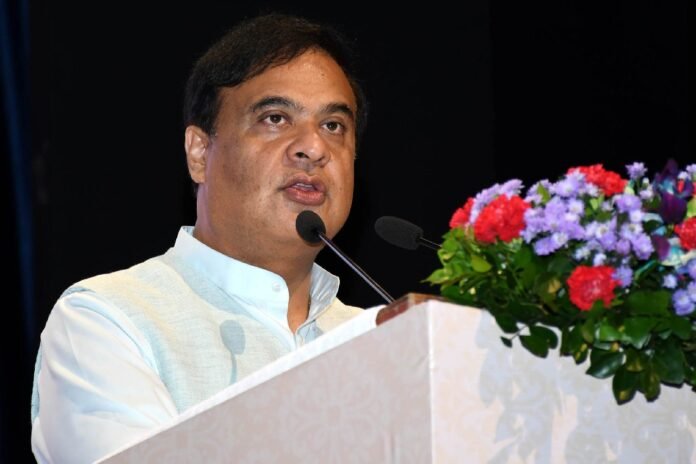In a fresh round of political sparring, Assam Chief Minister Himanta Biswa Sarma has taken aim at Rahul Gandhi over his stance on the reservation system in India. Sarma labeled Gandhi’s position as an outdated view held by the Gandhi family, reflecting a long-standing political ideology that, according to Sarma, does not align with the needs of modern India. The comments have sparked a political debate, bringing the reservation issue to the forefront of national discourse.
Himanta Biswa Sarma’s Criticism
During a public address, Himanta Biswa Sarma sharply criticized Rahul Gandhi‘s views on reservations, calling them reflective of the “old Gandhi family” ideology, which, according to Sarma, fails to address the evolving demands of India’s socio-political landscape.
- Outdated Perspective: Sarma argued that the Gandhi family has consistently held a static view on reservations, focusing more on vote-bank politics than genuine empowerment of marginalized communities. He claims that the Congress Party has historically used the reservation issue as a political tool rather than working towards real change.
- Need for Reform: Sarma emphasized that while reservations are crucial for uplifting Scheduled Castes (SCs), Scheduled Tribes (STs), and other Backward Classes, the current framework requires modernization to meet the needs of today’s India. He accused Rahul Gandhi of clinging to old policies that no longer serve the larger purpose of national progress.
- Economic vs. Caste-based Reservations: In his critique, Sarma also pointed out that Rahul Gandhi’s approach largely focuses on caste-based reservations, whereas Sarma advocated for considering economic criteria in addition to caste. He suggested that economic empowerment, especially in states like Assam, should be given priority to address disparities more effectively.
Rahul Gandhi’s Reservation Stance
Rahul Gandhi, in various speeches and public appearances, has defended the need for caste-based reservations, emphasizing that they remain essential for addressing centuries of oppression faced by SCs, STs, and Other Backward Classes (OBCs). Gandhi has long argued that reservations are a constitutional right for these communities and are necessary to achieve social justice and equality.
Key points of Rahul Gandhi’s stance on reservations include:
- Commitment to Social Justice: Gandhi maintains that the reservation system is a crucial instrument for achieving social justice in India, particularly for marginalized communities that have been historically excluded from socio-economic opportunities.
- Opposition to Diluting Reservations: Rahul Gandhi and the Congress Party have consistently opposed efforts to dilute the reservation system, particularly any moves to prioritize economic criteria over caste in reservation policies.
- Protecting the Rights of Minorities: Gandhi’s approach underscores the importance of protecting the rights of minorities and ensuring that the benefits of reservations reach the most vulnerable sections of society.
Political Implications of the Debate
The reservation debate between Himanta Biswa Sarma and Rahul Gandhi has brought a key issue to the forefront of Indian politics. With elections approaching in various states, both leaders are trying to rally their respective bases by appealing to different perspectives on reservations.
- BJP’s Stance on Reservations: The BJP, under leaders like Himanta Biswa Sarma, has advocated for a more nuanced approach to reservations, which considers economic factors alongside caste. Sarma’s comments suggest that the BJP may push for reforms in the reservation system to address economic disparities in addition to caste-based ones.
- Congress’s Defense of Caste-based Reservations: Rahul Gandhi’s defense of the traditional caste-based reservation system aligns with the Congress Party’s long-held view that reservations are a necessary tool for social justice. Gandhi’s stance resonates with a large section of the party’s support base, including SCs, STs, and OBCs.
The debate over reservation policy has far-reaching implications for India’s future. As the country continues to grapple with issues of caste-based inequality and economic disparity, the question of how reservations should be structured and implemented remains crucial.
- Caste vs. Economic Criteria: The ongoing political discourse reflects a larger debate about whether India should move towards economic-based reservations, as advocated by some political figures, or maintain the caste-based system that has been in place since the country’s independence.
- Balancing Social Justice with Modernization: As India modernizes, there is growing recognition that the reservation system may need reforms to ensure that it serves both traditional social justice goals and addresses the challenges of a fast-changing economy.
- Regional Impact: In states like Assam, where economic disparities and caste-based inequalities intersect, the way in which reservation policies are framed and implemented will play a crucial role in determining social and economic progress.
The war of words between Himanta Biswa Sarma and Rahul Gandhi over the reservation system underscores the complex nature of this issue in India’s socio-political landscape. While Gandhi remains committed to defending the caste-based reservation system, Sarma’s critique highlights the growing demand for reforms that include economic factors.



